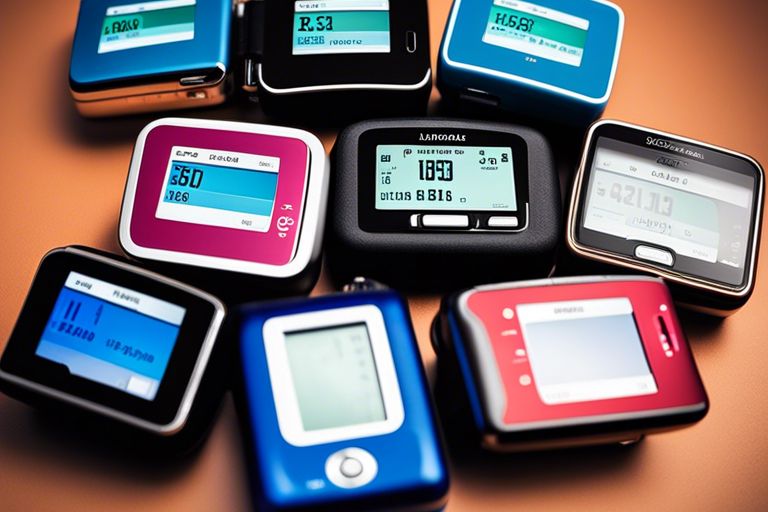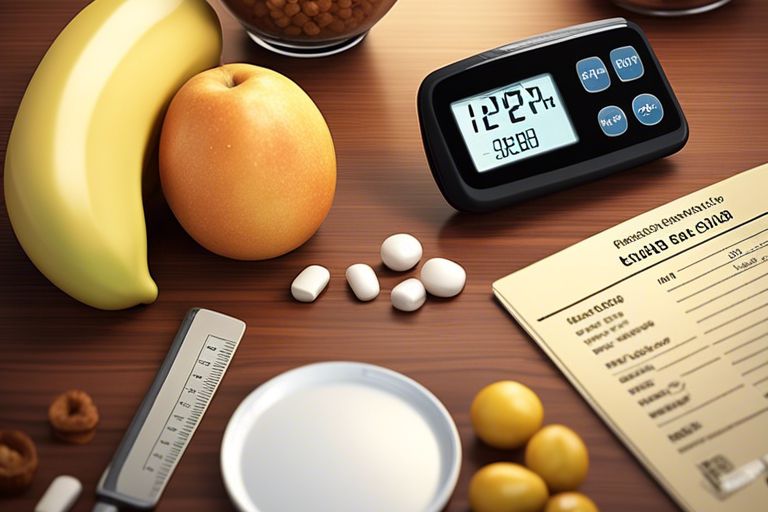Ensuring optimal health while managing Type 1 diabetes requires diligence and awareness of potential complications that may arise. By implementing a proactive approach and following a structured plan, individuals can effectively minimize the risks associated with this chronic condition. This step-by-step guide will provide invaluable insights and practical tips on how to prevent Type 1 diabetes complications, empowering individuals to take control of their health and well-being.
Key Takeaways:
- Monitor Blood Sugar Levels: Regularly checking blood sugar levels can help prevent complications associated with type 1 diabetes.
- Follow a Healthy Diet: Eating a balanced diet low in sugar and high in fiber can help control blood sugar levels and reduce the risk of complications.
- Exercise Regularly: Physical activity can improve insulin sensitivity and overall health, reducing the risk of complications associated with type 1 diabetes.
- Take Medications as Prescribed: Following the prescribed medication regimen, including insulin therapy, can help manage blood sugar levels and prevent complications.
- Regular Medical Check-ups: Seeing a healthcare provider regularly for check-ups and screenings can help detect and manage any complications early.
Managing Blood Sugar Levels
While living with type 1 diabetes, managing blood sugar levels is crucial to prevent complications and maintain good health. Proper management involves a combination of monitoring techniques and lifestyle adjustments to keep glucose levels within a target range. Here are some practical steps to help you effectively manage your blood sugar levels.
Monitoring Techniques
Techniques for monitoring blood sugar levels include regular self-testing using a glucometer, continuous glucose monitoring (CGM) systems, and periodic A1C checks. Self-testing involves pricking your finger to obtain a blood sample and measuring your current glucose levels. CGM systems provide real-time data on glucose levels throughout the day, giving you valuable insights into trends and patterns. Periodic A1C tests offer a long-term overview of your average blood sugar levels over the past two to three months.
Consistent monitoring allows you to track how your body responds to food, physical activity, medications, and other factors. By identifying patterns and trends, you can make informed decisions about your diabetes management plan and adjust your routine as needed to maintain optimal blood sugar control.
Tips for Maintaining Optimal Glucose Levels
Managing your blood sugar levels can be challenging, but adopting healthy habits can make a significant difference in your overall well-being. Here are some tips to help you maintain optimal glucose levels:
- Eat a balanced diet rich in fruits, vegetables, whole grains, lean proteins, and healthy fats.
- Stay physically active through regular exercise to help lower blood sugar levels and improve insulin sensitivity.
- Monitor your carbohydrate intake and consider working with a dietitian to develop a personalized meal plan.
- Stay hydrated and limit consumption of sugary drinks and alcohol.
For instance, keeping a food diary can help you track your meals and identify any patterns that may impact your blood sugar levels. This proactive approach allows you to make necessary adjustments to your diet and lifestyle to achieve better glucose control.
Lifestyle Factors That Aid Prevention
Assuming you are looking to prevent type 1 diabetes complications, certain lifestyle factors can play a crucial role in reducing the risk of developing this condition. By incorporating healthy habits into your daily routine, you can effectively lower the chances of complications arising from type 1 diabetes.
- Nutritional Guidelines
- Exercise Recommendations
Nutritional Guidelines
One of the key factors in preventing type 1 diabetes complications is maintaining a balanced and nutritious diet. Consuming a variety of fruits, vegetables, whole grains, lean proteins, and healthy fats can help regulate blood sugar levels and promote overall health. It is also essential to monitor carbohydrate intake and avoid foods high in sugar to prevent spikes in blood glucose levels.
Recognizing the significance of a healthy diet in managing type 1 diabetes can lead to better outcomes and reduce the risk of complications down the line. Consulting with a dietitian or nutritionist can provide personalized guidance on creating a meal plan that meets your specific needs and helps maintain stable blood sugar levels.
Exercise Recommendations
With regular physical activity, you can not only improve your overall health but also reduce the risk of complications associated with type 1 diabetes. Incorporating aerobic exercises, strength training, and flexibility exercises into your routine can help control blood sugar levels, boost cardiovascular health, and enhance insulin sensitivity.
It is important to consult with your healthcare provider before starting any new exercise regimen to ensure it is safe and appropriate for your individual health needs. By engaging in regular exercise and staying active, you can significantly reduce the likelihood of experiencing complications related to type 1 diabetes.
Medical Management Strategies
Medication Adherence
Adherence to prescribed medications is crucial for managing type 1 diabetes and preventing complications. It is important to follow your healthcare provider’s instructions regarding insulin therapy or other medications. Skipping doses or not taking medications as prescribed can lead to uncontrolled blood sugar levels, increasing the risk of complications. Set reminders, establish a routine, and communicate any challenges you face in adhering to your medication regimen with your healthcare team.
Consistent medication adherence can help stabilize blood sugar levels, reduce the chances of hypoglycemia or hyperglycemia, and lower the risk of long-term complications such as heart disease, nerve damage, and vision problems. It is essential to take your medications as directed, monitor your blood sugar levels regularly, and discuss any concerns or issues with your healthcare provider to ensure optimal management of your condition.
Regular Health Check-ups and Screenings
Medical guidelines recommend regular health check-ups and screenings for individuals with type 1 diabetes to monitor their overall health and detect any early signs of complications. These check-ups may include assessments of blood pressure, cholesterol levels, kidney function, and eye examinations. It is important to attend these appointments as scheduled and communicate any symptoms or changes in your health to your healthcare provider promptly.
A comprehensive approach to managing type 1 diabetes includes staying proactive about your health by scheduling and attending regular check-ups and screenings. Early detection of complications allows for timely interventions and treatments, leading to better outcomes and improved quality of life. Bear in mind, prevention and early intervention are key to minimizing the impact of diabetes-related complications.
Advanced Tips and Considerations
Unlike basic preventive measures, advanced tips and considerations can help individuals with type 1 diabetes effectively manage their condition and reduce the risk of complications. By incorporating these strategies into daily routines, individuals can take proactive steps towards maintaining better health.
- Regular Monitoring: Track blood sugar levels consistently to identify patterns and trends.
- Consulting Specialists: Seek guidance from endocrinologists and diabetes educators for personalized care.
- Proactive Lifestyle Changes: Implement dietary modifications and exercise routines to support overall well-being.
Recognizing Warning Signs
Advanced vigilance is crucial in recognizing warning signs of potential complications related to type 1 diabetes. Symptoms such as extreme fatigue, unexplained weight loss, and frequent urination should not be ignored. Regular check-ups and communication with healthcare providers are essential to address any emerging issues promptly.
Furthermore, being aware of fluctuations in blood sugar levels and understanding the significance of factors like stress and illness can aid in early detection of complications. By staying attuned to subtle changes in health, individuals can take proactive steps to prevent serious consequences.
Embracing Technological Aids
Technological advancements offer valuable tools for individuals with type 1 diabetes to manage their condition effectively. Devices such as continuous glucose monitors (CGMs) and insulin pumps can provide real-time data and automated delivery, enhancing precision in treatment. Embracing these aids can lead to better glycemic control and improve overall quality of life.
Embracing technological aids also involves staying informed about the latest innovations in diabetes management. From smartphone apps to artificial pancreas systems, incorporating cutting-edge technology into daily routines can empower individuals to take control of their health with confidence.
Summing up
Considering all points discussed in this guide on how to prevent Type 1 diabetes complications, it is clear that proactive management is key to maintaining good health and minimizing the risks associated with the condition. By closely monitoring blood sugar levels, adhering to a healthy diet, staying physically active, taking medications as prescribed, and attending regular check-ups with healthcare providers, individuals with Type 1 diabetes can significantly reduce the likelihood of developing complications. It is important to remember that the responsibility for managing the condition lies with the individual, and by following these steps diligently, one can lead a fulfilling and healthy life despite having Type 1 diabetes.
FAQ
Q: What is Type 1 Diabetes?
A: Type 1 diabetes is a chronic condition where the pancreas produces little to no insulin, a hormone needed to allow sugar (glucose) to enter cells to produce energy.
Q: What are the complications of Type 1 Diabetes?
A: Complications of Type 1 diabetes can include heart disease, nerve damage, kidney damage, eye damage, skin conditions, and foot damage.
Q: How can I prevent complications from Type 1 Diabetes?
A: You can prevent complications from Type 1 Diabetes by managing your blood sugar levels, eating a healthy diet, staying active, monitoring your blood pressure and cholesterol, avoiding smoking, and attending regular check-ups with your healthcare provider.
Q: Why is it important to prevent complications from Type 1 Diabetes?
A: Preventing complications from Type 1 Diabetes is crucial because they can lead to serious health issues, lower quality of life, and increased risk of premature death.
Q: What should I do if I notice any signs of complications from Type 1 Diabetes?
A: If you notice any signs of complications from Type 1 Diabetes such as frequent urination, excessive thirst, fatigue, or numbness in the extremities, you should consult your healthcare provider immediately for proper evaluation and treatment.




